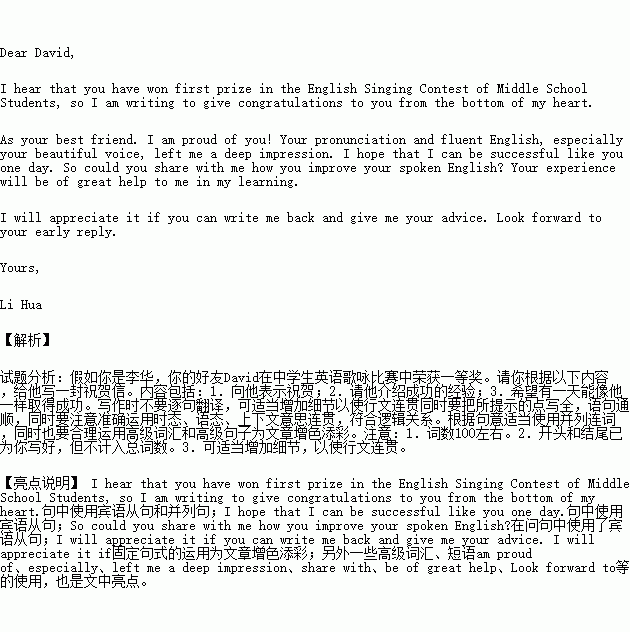题目内容
书面表达
假如你是李华,你的好友David在中学生英语歌咏比赛中荣获一等奖。请你根据以下内容,给他写一封祝贺信。内容包括:
1.向他表示祝贺;
2.请他介绍成功的经验;
3.希望有一天能像他一样取得成功。
注意:
1.词数100左右。
2.开头和结尾已为你写好,但不计入总词数。
3.可适当增加细节,以使行文连贯。
Dear David,
I hear that you have own first prize
_____________________________________________________________________________
_____________________________________________________________________________
_____________________________________________________________________________
Yours,
Li Hua
 期末好成绩系列答案
期末好成绩系列答案 99加1领先期末特训卷系列答案
99加1领先期末特训卷系列答案 百强名校期末冲刺100分系列答案
百强名校期末冲刺100分系列答案书面表达
2013年高考在即, 高三全体学生目前正处在紧张复习迎考的氛围中。假如你叫李华,高三学生,面对目前的压力,想和父母说说知心话,请你用英文在你的博客上用书信形式表达出来。主要内容如下:
知心话 | 感 恩 | 关切鼓励,倾注爱心 |
对父母的期望 | 1. 多交流,使自己保持良好状态 2. 创造条件,给自己提供适时帮助 | |
学习打算 | 考生自拟(至少写三点) | |
注意:1. 短文须包括所有内容要点,可适当发挥。
2. 词数:150左右。开头和结尾已给出,不计入总词数。
Dear Mom and Dad,
The annual college entrance examination is around the corner. On this special occasion, how I wish I could have a heart-to-heart talk with you.
_______________________________________________________________________________
_______________________________________________________________________________
_______________________________________________________________________________
Lihua


 ),并在其下面写出该加的词。
),并在其下面写出该加的词。